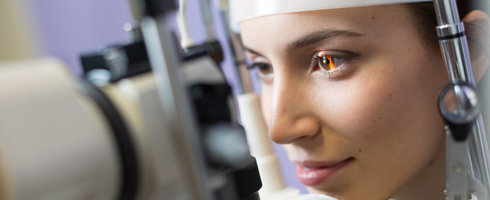REFRACTIVE ERROR CLINIC

Laser vision correction of refractive errors (Myopia, Hypermetropia and Astigmatism) including customized LASIK with the state-of-the-art Star S4 Excimer Laser system. The ultimate in laser vision correction, the 100% blade-free all-laser technology is available in Dr.Jacob's eye hospital. Consultation for Refractive surgeries like LASIK, ICL (implantable contact lens) and Multifocal IOLs. The surgeon being the Accredited by companies like Alcon, Abott, Bausch & Lomb and the only accredited surgeon in the town of Cochin for STAAR ICL.
What are refractive errors?
In people with refractive error (or poor vision, such as near-sightedness or far-sightedness), the light rays do not get focused on to the retina and therefore, blurred images are formed. These can be measured as aberration patterns.
Why would you be interested in LASIK?
- You do not want to wear spectacles or contact lenses
- You feel visually and socially restricted by spectacles or contact lenses
- You are intolerant to contact lenses
- You want to participate in certain outdoor sports where using spectacles or contact lenses may be a problem
- You plan to join certain professions wherein excellent uncorrected visual acuity is a prerequisite

Frequently Asked Questions
- You must be above 18 years old
- You should not have had a significant change in your spectacle prescription for the past 12 months
- You should not have any ocular surface abnormality such as dry eyes
- Your cornea should have adequate thickness for it to be operated upon
The patient undergoes a normal eye examination after which the ophthalmologist may suggest a vision corrective procedure. Thereafter, information about the patient's eye structure and function - including corneal thickness, corneal curvature, optical aberrations etc. - will be ascertained. All this is done at Dr.Jacob's eye hospital using state-of-the-art diagnostic equipment. The eye test reports are studied by the ophthalmologist before making a final decision, in consultation with the patient.
At Dr.Jacob's eye care hospital, laser surgery is done on an out-patient basis; this means you go home immediately after surgery. A relative or friend, who can take you home after the surgery, should accompany you. Usually, one eye is treated at a time. The procedure is performed under topical anesthesia. You will be made to lie down on a couch and asked to look up at the microscope where you will see a blinking green light. When the suction ring is applied, your vision will fade out. You will start seeing the light again after the suction ring is removed. The whole procedure will be over in a few minutes. Usually there is no pain during the procedure.
Once surgery is over your eye will be covered with a shield after the administration of some drops and ointment. You can return home immediately. You may experience pain for the first 24 to 36 hours, for which you will have to take oral analgesics. You will have to come for follow up visits from the very next day onwards. Your doctor will schedule the check-ups as necessary. The usual routine is:
- First check-up in the morning after surgery
- Seven days from the date of surgery
- One month from the date of surgery
- Three months from the date of surgery
- One year from the date of surgery
You will undergo special diagnostic tests at each visit to the Institute aimed at assessing your visual acuity. It is important that you visit the doctor as scheduled on every appointment. You will be advised to use eye drops or other medication during the post-operative period.
Your vision will become clear within a few days. Sometimes you may require another round of treatment with laser, particularly with higher degrees of refractive error.
Important!
Although LASIK is an excellent procedure for low and moderate refractive errors, it may not totally remove the need for using glasses in everybody. However, it definitely decreases the dependence on glasses for day to day work.
Possible side-effects
Laser surgery is very safe and effective. But in some patients there could be side effects. Your doctor will be happy to discuss these with you and clear your doubts before surgery.
Possible side-effects
- Possible side-effects
Laser surgery is very safe and effective. But in some patients there could be side effects. Your doctor will be happy to discuss these with you and clear your doubts before surgery. - Undercorrection/overcorrection:
Undercorrection may sometimes be planned intentionally or may occur as an unintentional effect. As a result, the eye remains short sighted even after the surgery. If the degree of residual myopia is significant, the eye may be retreated at a later date. Overcorrection can occur very rarely. - Glare/halo effect:
You may feel some sensitivity to light at night or in bright sunlight. Sometimes in dim light, you may see a faded ghost image around the sharp bright image. This will pass after the first few days or weeks. - Decrease in contrast sensitivity:
Some people find that their night time vision has become a bit dull. This happens because of a decrease in their ability to discriminate between different contrast levels. - Flap complications:
Sometimes the anterior corneal flap that is made in LASIK may not be complete if the keratome stops mid-way because of suction loss. In this situation the flap is repositioned and ablation is deferred. The surgery is re-attempted after three months. In rare instances, the flap may tear or become detached. - Corneal ecstasia:
Corneal ecstasia can occur if the corneal thickness is less to begin with, or if the cornea is thinned more than it can withstand with the lasers. Therefore, persons having inadequate corneal thickness are not suitable candidates for LASIK. - Other complications:
Serious complications like corneal infections, corneal edema, corneal perforation etc., though possible, are extremely rare.
For people with nearsightedness (myopia), farsightedness (hyperopia) or astigmatism, LASIK surgery could be the key to a life free of bulky spectacles or contact lenses. But not everybody is a suitable candidate for this type of laser eye surgery. Here are the few main questions a LASIK surgeon is likely to ask you during a consultation.
If you're under 18, the LASIK surgeon will ask you to wait, just to make sure your vision is stabilized. If you're in your early 40s, you need to be aware that you might still need reading glasses later on. If you're in your 60s, you will need to be assessed for pre-existing cataracts. If you have them, cataract surgery might actually solve your vision problem, in addition to correcting any myopia, hyperopia, astigmatism or presbyopia that you might have.
No matter your age, it's important for your eyesight to have stabilized for at least a year before you have laser surgery.
In terms of refraction (i.e. spectacle degree), the main limitation to LASIK is the patient's cornea thickness. This means that even patients who have high myopia or astigmatism can undergo LASIK as long as their cornea is sufficiently thick.
There are quite a few eye conditions that need to be screened before LASIK surgery. Your doctor will check if you suffer, among other things, from ocular herpes, diabetic retinopathy, retinal detachment, dry eye syndrome or Keratoconus, a progressive thinning of the cornea.
Autoimmune diseases, such as rheumatoid arthritis, lupus or multiple sclerosis, are generally considered a contraindication for LASIK, as they might prompt an unexpected response to the laser surgery. Other conditions such as type 2 diabetes do not necessarily mean the surgeon will turn you away. However, they need to be well controlled to ensure a favorable healing situation. Similarly, some drugs or steroids may compromise post-op recovery. Tell your doctor about any and all medications you're taking.
Pregnant and nursing women undergo hormonal changes which can cause fluctuations in the vision. It is advisable that they wait at least 6 months after pregnancy or breastfeeding, whichever is later, before undergoing LASIK.
Equipped with trained and experienced eye specialists to help the patients in dealing of respective issues with specialization and care with advanced Blade-free LASIK surgery. This laser eye treatment creates flap in Blade-free LASIK which reduces risk of an irregular flap. You can trust our renowned eye specialists for Lasik eye surgery which is one of the Lasik Treatment in India.

 Dr Jacob's
Dr Jacob's  Book Now
Book Now